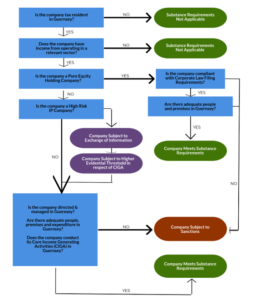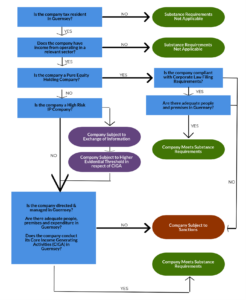The Isle of Man Treasury has published a draft of the proposed Income Tax (Substance Requirements) Order 2018. This draft Order will, once final, and if approved by Tynwald (in December 2018), have effect in respect of accounting periods commencing on or after 1 January 2019.
This means that from January 2019, companies engaging in “relevant activities” will have to demonstrate that they meet specific substance requirements, to avoid sanctions.
This Order is in response to a comprehensive review that was carried out by the EU Code of Conduct Group on Business Taxation (COCG) in order to assess over 90 jurisdictions, including the Isle of Man (IOM) against standards of:
– Tax transparency;
– Fair taxation;
– Compliance with anti-BEPS (base-erosion profit shifting)
The review process took place in 2017 and although the COCG were satisfied that the IOM met the standards for tax transparency and compliance with anti-BEPS measures, the COGC raised concerns that the IOM, and other Crown Dependencies did not have:
“A legal substance requirement for entities doing business in or through the jurisdiction.”
High Level Principles
The purpose of the proposed legislation is to address the concerns that companies in the IOM (and other Crown Dependencies) could be used to attract profits that are not commensurate with economic activities and substantial economic presence in the IOM.
The proposed legislation therefore requires relevant sector companies to demonstrate they have substance in the Island by:
- Being directed and managed in the Island; and
- Conducting Core Income Generating Activities (CIGA) in the Island; and
- Having adequate people, premises and expenditure in the
Each of these requirements is discussed in further detail below.
The IOM’s Response
In late 2017, along with many other jurisdictions facing potential blacklisting, the IOM committed to address these concerns by the end of December 2018.
Due to identical concerns being raised in Guernsey and Jersey, the governments of the IOM, Guernsey and Jersey have been working closely together to develop proposals to meet their commitments.
As a result of the work published in Guernsey and Jersey, the IOM has published its legislation and limited guidance, in draft. Please note further guidance will be forthcoming in due course.
The legislation is similar across the three jurisdictions.
The remainder of this article focuses specifically on the IOM draft legislation.
The Income Tax (Substance Requirements) Order 2018
This Order will be made by the Treasury and is an amendment to the Income Tax Act 1970.
This new legislation sets out to address EU Commission and COCG concerns by way of a three-stage process:
- To identify companies carrying out “relevant activities”; and
- To impose substance requirements on companies undertaking relevant activities; and
- To enforce the substance
Each of these stages and their ramifications are discussed below.
Stage 1: To identify companies carrying out “relevant activities”
The Order will apply to IOM tax resident companies engaged in relevant sectors. The relevant sectors are as follows:
a. banking
b. insurance
c. shipping
d. fund management (this does not include companies that are Collective Investment Vehicles)
e. financing and leasing
f. headquartering
g. operation of a holding company
h. holding intellectual property (IP)
i. distribution and service centres
These are the sectors identified as a result of the work, by the Organisation for Economic Cooperation and Development’s (OECD) Forum on Harmful Tax Practices (FHTP), on preferential regimes. This list represents the categories of geographically mobile income i.e. these are the sectors which are at risk of operating and deriving their income from jurisdictions other than those in which they are registered.
There is no de minimus in terms of income, the legislation will apply to all companies carrying on relevant activities where any level of income is received.
A key determinant is tax residence and the Assessor has indicated that existing practice will prevail, i.e. the rules set out in PN 144/07. Therefore where non-IOM incorporated companies are engaged in relevant sectors they will only be brought within the scope of the Order if they are IOM tax resident. This is clearly an important consideration: if resident elsewhere the rules relevant to that country of residence are likely to be the binding rules.
Stage 2: To impose substance requirements on companies undertaking relevant activities
The specific substance requirements vary by relevant sector. Broadly speaking, for a relevant sector company (other than a pure equity holding company) to have adequate substance it must ensure that:
a. It is directed and managedin the island.
The Order specifies that the company is directed and managed* in the Island. Regular board meetings should take place on the Island, there must be a quorum of directors physically present at the meeting, strategic decisions must be made at the meetings, the minutes of the board meetings must be kept on Island and the directors present at these meetings must have the necessary knowledge and expertise ensure that the board can discharge its’ duties.
* Note that the test for “directed and managed” is a separate test to the “management and control” test which is used to determine the tax residence of a company. The aim of the directed and managed test is to ensure that there are an adequate number of Board meetings held and attended in the Island. Not all Board meetings need to be held on Island, we discuss the meaning of “adequate” later in this article.
b. There is an adequate number of qualified employees in the Island.
This stipulation appears to be rather vague as the legislation specifically states that the employees do not need to be employed by the company, this condition focuses on there being an adequate number of skilled workers present on Island, whether or not they are employed elsewhere does not matter.
In addition, what is meant by ‘adequate’ in terms of numbers is very subjective and for the purpose of this proposed legislation, ‘adequate’ will take its ordinary meaning, as discussed below.
c. It has adequate expenditure, proportionate to the level of activity carried on inthe Island.
Again, another subjective measure. It would, however, be unrealistic to apply a specific formula across all businesses, as each business is unique in its own right and it is the responsibility of the Board of Directors to ensure that such conditions are met.
d. It has adequate physical presence in the Island.
Although not defined, this is likely to include owning or leasing an office, having ‘adequate’ number of staff, both administrative and specialist or qualified staff working in the office, computers, telephone and internet connection etc.
e. It conducts core income-generating activity in the Island
The Order attempts to specify what is meant by ‘core income-generating activity’ (CIGA) for each of the relevant sectors, the list of activities are intended as a guide, not all companies will carry out all of the activities specified, but they must carry out some in order to comply.
If an activity is not part of the CIGA, for example, back office IT functions, the company may outsource all or part of this activity without there being an effect upon the company’s ability to comply with the substance requirement. Likewise, the company may seek expert professional advice or engage specialists in other jurisdictions without effecting its compliance with the substance requirements.
In essence, CIGA ensures that the main operations of the business, i.e. the operations which produce the bulk of the income are carried out in the Island.
Outsourcing
Further to that mentioned above, a company may outsource, i.e. contract or delegate to a third party or group company, some or all of its activities. Outsourcing is only a potential issue if it relates to CIGA. If some, or all, of the CIGA are outsourced, the company must be able to demonstrate that there is adequate supervision of the outsourced activity and that the outsourcing is to an IOM businesses (which themselves have adequate resources to perform such duties). Precise details of the outsourced activity, including, for example, timesheets must be kept by the contracting company.
The key here is the value that the activities outsourced generate, if CIGA. In some instances, for example, outsourcing coding activities, very little might be generated in terms of value, but it could be design, marketing and other activities carried out locally that are integral to value creation. Companies will need to look closely at where the value comes from, ie who generates it to assess whether outsourced activities are an issue.
“Adequate”
The term ‘adequate’ is intended to take its dictionary definition:
“Enough or satisfactory for a particular purpose.”
The Assessor has advised that:
“What is adequate for each company will be dependent upon the particular facts of the company and its business activity.”
This will vary for each relevant sector entity and the onus is on the relevant company to ensure that it maintains and retains sufficient records which demonstrate that it has adequate resources in the Island.
Stage 3: To enforce the substance requirements
The Order provides the Assessor with the power to request any information required to satisfy her that a relevant sector company meets the substance requirements. Where the Assessor is not satisfied that the substance requirements have been met for a particular period, sanctions will apply.
Verification of Substance Requirements
The draft legislation provides the Assessor with the power to request further information from a relevant sector company in order to satisfy herself that the substance requirements have been met.
Failure to comply with the request can result in a fine not exceeding £10,000. Where the Assessor is not satisfied that the substance requirements have been met, sanctions will apply.
High-risk IP Companies
Generally speaking, the designation ‘high-risk IP companies’ refers to companies holding IP where (a) the IP has been transferred into the Island post-development and/ or the main utilisation of the IP is off-Island or (b) where IP is held on Island but the CIGA are carried out off-island.
As the risks of profit shifting are considered to be greater, the legislation has taken a rather hard approach to high risk IP companies, it takes the position of ‘guilty unless proven otherwise’.
High-risk IP companies will have to prove for each period that the adequate substance requirements in respect of conducting core income-generating activity have been met in the Island. For each high risk IP company, the tax authorities of the IOM will exchange all of the information provided by the company with the relevant EU Member State authority where the immediate and/or ultimate parent and beneficial owner is/are resident. This will be in accordance with the existing international tax exchange agreements.
“To rebut the presumption and not incur further sanctions, the high risk IP company will have to provide evidence explaining how the DEMPE (development, enhancement, maintenance, protection and exploitation) functions have been under its control and this had involved people who are highly skilled and perform their core activities in the Island”.
The high evidential threshold includes detailed business plans, concrete evidence that decision making occurs in the Island and detailed information regarding their IOM employees.
Sanctions
In line with the tougher approach taken towards IP companies detailed above, sanctions are somewhat harsher for such companies.
Whether or not the substance requirements have been met, in accordance with international arrangement, the Assessor will disclose to a relevant EU tax official any relevant information concerning a high-risk IP company.
If a high-risk IP company is unable to rebut the presumption that it has failed to meet the substance requirements, the sanctions are as follows, (stated by the number of consecutive years of non-compliance):
– 1st year, a civil penalty of £50,000
– 2nd year, a civil penalty of £100,000 and may be struck off the company register
– 3rd year, strike the company off the company register
If the high-risk IP company is unable to provide the Assessor with any additional information requested, the company will be fined a maximum £10,000.
For all other companies engaged in relevant sectors (other than high risk IP), the sanctions are as follows, (stated by the number of consecutive years of non-compliance):
– 1st year, a civil penalty of £10,000
– 2nd year, a civil penalty of £50,000
– 3rd year, a civil penalty of £100,000 and may be struck off the company register
– 4th year, strike the company off the company register
For any year of non-compliance of a company operating in a relevant sector, the Assessor will disclose to an EU tax official any relevant information which relates to the company, this could represent a serious reputational risk to the company.
Anti-avoidance
If the Assessor finds that in any accounting period a company has avoided or attempted to avoid the application of this Order, the Assessor may:
– Disclose information to a foreign tax official
– Issue to the company a civil penalty of £10,000
A person (note that “a person” is not defined within this legislation) who has fraudulently avoided or seeks to avoid the application is liable to:
– On conviction: custody for a maximum of 7 years, a fine or both
– On summary conviction: custody for a maximum of 6 months, a fine not exceeding £10,000,or both
– Disclosure of information to a foreign tax official
Any appeals will be heard by the Commissioners who may confirm, vary or reverse the Assessor’s decision.
Conclusion
Companies operating in relevant sector industries are now under pressure to ensure that they comply with the new legislation which will commence at the start of 2019.
This will have a significant affect upon many IOM businesses who have only a short amount of time to demonstrate to the authorities that they are compliant. The potential penalties of non-compliance may cause detrimental reputational risk, fines of up to £100,000 and could even cause a company to eventually be struck off, after potentially, as little as two years of continuous non-compliance for high risk IP companies and three years of non-compliance for other relevant sector companies.
Where does this leave us?
All companies must consider whether they fall within the relevant sectors, if not then there are no obligations falling upon them by this Order. However, if they are in a relevant sector then they will need to assess their position.
Many companies will be easily able to identify whether or not they fall within a relevant sector and companies managed by CSPs may need to assess whether they have the necessary substance.
What might change?
We are on the brink of Brexit and, to date, much of the discussions have taken place with the EU commission and the draft legislation has been reviewed by them; however, the COCG will only meet to discuss such matters as blacklisting in February 2019.
It therefore remains to be seen whether the COCG agree that the proposals go far enough. What is clear, is that this legislation is here to stay in some shape or form and therefore companies need to consider their position as soon as possible.
Reporting
The earliest reporting date would be accounting period ended 31 December 2019 and therefore reporting by 1 January 2020.
Corporate tax returns will be amended to include sections which will gather the information in relation to the substance requirements for companies operating within relevant sector industries.
How can we help?
If you think that your business may be affected by the new legislation, it is important that you begin assessing and taking appropriate action now. Please contact the Dixcart office in the Isle of Man to discuss substance requirements in more detail: advice.iom@dixcart.com.
Dixcart Management (IOM) Limited is licensed by the Isle of Man Financial Services Authority.














